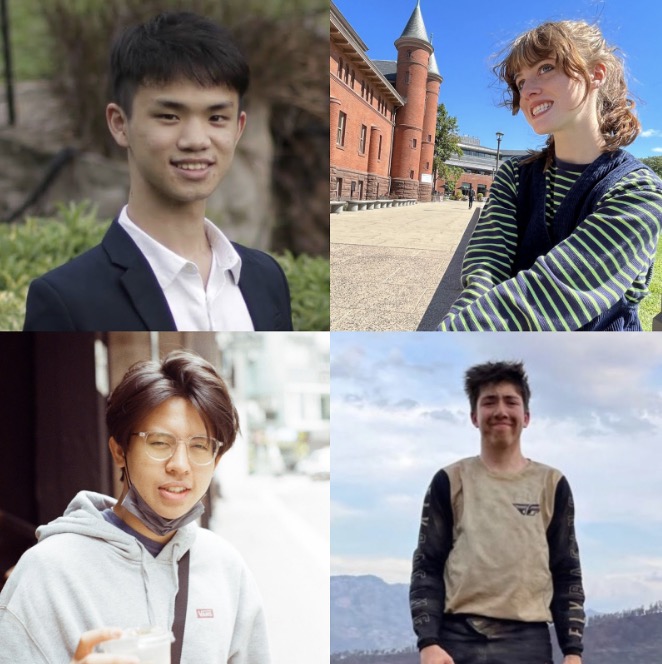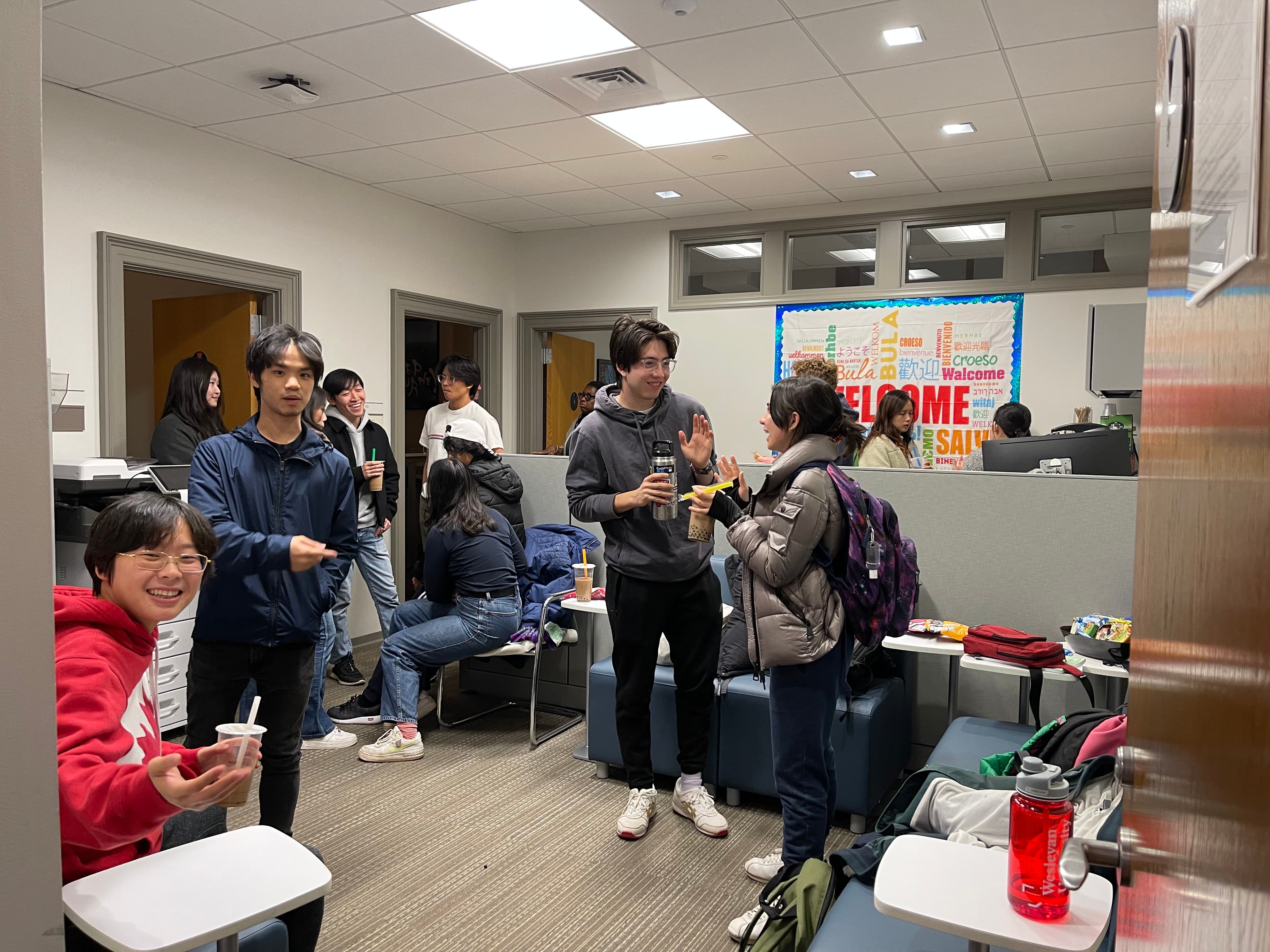
c/o Sida Chu, Staff Writer
Four undergraduate students—Zachary Berkenkotter ’26, David Calderon ’26, Megan Sigalos ’25, and Wesley Tan ’26—were selected to join the International Student Advisory Board (ISAB) for the 2022-2023 academic year. ISAB works closely with the Office of International Student Affairs (OISA) and seeks to improve the experiences of the University’s international student community.
Tan, who considers Singapore to be home, applied to join ISAB because he wanted to build a more tight-knit international student community.
“I believe that international students add diversity of thought and cultures to Wesleyan,” Tan wrote in an email to The Argus. “I hope to build a more connected international student body, and I believe that ISAB is the best way for me to advance this. Personally, I have benefitted by the networks and guidance of upperclassmen in [the Freeman Asian Scholars Association], and I hope to build similar mechanisms within Wesleyan not only in the orientation stage but in better preparing international students for life after Wesleyan.”
Echoing Tan’s sentiments, Berkenkotter also stressed the value of community. Born in the Philippines, Berkenkotter considers Hong Kong, where he has lived for the past 10 years, to be his home. Coming from an international background with experience in organizing community-building events during high school, he was inspired to support the international student community at the University.
“I feel like investing in your community is one of the most meaningful and rewarding experiences you can go through,” Berkenkotter wrote in an email to The Argus. “You feel more connected to and passionate about your community, improve—no matter how small or big—its well-being, and form bonds through the stressful endeavor of working with admin.”
Similarly, Calderon, originally from Guatemala City, joined ISAB because he felt welcomed by the international student community and wanted to give back.
“I joined so that I could ensure that future international students had as good of or a better transition to Wes than I did,” Calderon wrote in an email to The Argus. “I felt extremely welcomed by this community and still hang around mostly an international crowd so I felt like this was the best way for me to give back.”
Sigalos also wanted to have a more involved role in the international student community on campus. As a sophomore, she recounted feeling detached from the community last year. She decided to join ISAB because of her personal experience of growing up in several places around the world—including Hong Kong, Thailand, the United Kingdom, Switzerland, and most recently, the United Arab Emirates.
“I think moving around numerous countries my whole life has made me perceptive to the kinds of change that one can experience in a new cultural environment, and it can definitely be very intimidating,” Sigalos wrote in an email to The Argus. “So I want to work with ISAB to help new and old international students alike have resources and sources of general support for this, in any way that they need it, and maybe just [improve] the recognition of an international student community at all at Wes.”
When asked about specific concerns that they wish to address in ISAB, several members pointed to the issues faced by international students during breaks in the academic year.
“I believe that visa and immigration concerns are definitely a huge concern, especially [for] international students who are unable to return to their countries of origin during breaks,” Tan wrote. “I think this is a particularly sensitive topic as there are multiple possible reasons for this, from not having enough money for flights to political turmoil or visa restrictions. I’ve many friends in those situations and I think inclusivity should be a priority for ISAB and the OISA, especially in supporting international students during breaks—be it in lodging support or sponsoring their flight tickets back.”
Berkenkotter had also heard from international students who have difficulties meeting the minimum summer earnings requirement—a fixed amount that all students under financial aid have to fulfill no matter where they are in the world.
“The problem with this policy is that it severely stresses international students who go back home to countries where it is much harder to earn money,” Berkenkotter wrote. “This and many other unreasonable financial aid policies are something that I hope to help address however I can. Many international students already face a hard time living in a new country and spending large amounts of time away from family, so it’s only right that the school supports their needs and well-being in the best way possible.”
According to Sigalos, support for international students over school breaks is something that the new board has already started working on. In addition, she said the board is also working to improve campus outreach from OISA in their newly settled office.
“[The goal of ISAB is] to help international students at Wesleyan to come together in support of advocacy on campus, both with administration and also as a widespread community that exists on campus, despite how it may not always feel like it does,” Sigalos wrote. “But I didn’t even know [ISAB] existed until this year, and I want to make sure that it is a much more recognizable and acknowledged part of campus, especially for international students, to increase campus-wide knowledge about it.”
Moving on, Berkenkotter expressed that he is looking forward to the spring semester, when he plans to help organize more social events and create more ways for people to bond and have fun with each other. According to Calderon, the new board is working hard to revitalize the sense of community within the international student population on campus.
“We are well aware that the pandemic was really hard on everyone, but due to the diverse nature of the international community we felt like it suffered disproportionately,” Calderon wrote. “We do not have a set-in-stone plan of action as of now but stay on the lookout for some fun events coming shortly.”
As they work on new initiatives, the new ISAB members are also supporting current members with projects that they are already spearheading, such as collaborating with the First-Generation, Low-Income Advisory Board and improving OISA.
“Now that I’ve been more informed about other issues, I really want to support the OISA and see if we can provide them with the necessary resources and people they need to function sustainably,” Berkenkotter wrote. “The board has made me aware of how severely under-resourced the OISA is. It consists of two hardworking and dedicated directors, along with only a few student interns—who are tasked with handling all the issues that concern around a lofty 600 international students.”
Sigalos expressed similar concerns about OISA’s lack of resources, which she hopes to address as a new ISAB member.
“I hope to help expand the resources available in the OISA, and to help international students manage the transition to campus,” Sigalos wrote. “There can be many unspoken issues and factors that this transition entails. I wanted to learn more about what can be done to improve the well-being of international students here right now.”
Tan also pointed out the additional barriers international students may face in terms of career development, something he personally wants to focus on.
“A huge concern for international students is sourcing for internships/jobs which have certain nuances not faced by domestic students, especially due to visa issues among other concerns,” Tan wrote. “For instance, the current alumni directory does not reliably show the home countries of alumni and it is challenging to be connected to alumni from one’s home country. As such, I hope to work with the Gordon Career Center and the Office of Advancement to better enable international students to find appropriate internships and extracurricular activities.”

c/o Sida Chu, Staff Writer
As part of the ongoing International Education Week, OISA held an open house on Monday, Nov. 14 at its new office in Fisk 105. OISA Director Morgan Keller wanted to use this as an opportunity to introduce international students to the new ISAB members for the year. The event featured free snacks and bubble tea and was attended by about 50 students.
“[It’s a chance for students] to come into our new office space and see where that is and feel like they’re welcome here anytime, even not just to get advising support, but to actually have a community space for international students where they can hang out,” Keller said. “And to meet these [ISAB] members, connect with them on a person-to-person level, know who they are, learn more about what they do, and also meet us staff members. We just haven’t had a lot of students come into our space, so it’s kind of a community-building thing.”
Keller was also extremely pleased with the work that new ISAB members have been doing. The board meets weekly, and Keller joins their meeting every two weeks, representing OISA.
“They’re doing such amazing work already,” Keller remarked. “You can already tell that they’re asking great questions. They’re already participating very actively…. It’s all a volunteer thing. They don’t get paid for that work. They do it because they actually care about their peers or community. They work so hard.”
Keller commented that the new members are fortunate to learn from continuing ISAB members, who have been present since ISAB was formed.
“They’ve got a really great veteran group, who are so good at international student advocacy,” Keller said. “They know the institution, they know the different offices on campus. They really understand a lot of the needs and issues that are affecting international students. So they had the benefit of experience and knowledge already within the group. And then we now have new people from different countries and different cultures who are wonderful additions. So ISAB has a really bright future, but it’s all because of the students themselves.”
Going forward, the new student members expressed a sense of commitment.
“ISAB’s role on campus is to make sure that the international community’s voice is not only heard but that action is taken based on those desires whenever needed,” Calderon wrote. “Although ISAB would like to host some events here and there, our biggest goal is to make sure that the majority of the community does not have to think or reach out to us because of how well we are working behind the scenes.”
Sida Chu can be reached at schu@wesleyan.edu.
Comments are closed